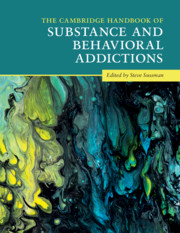Book contents
- The Cambridge Handbook of Substance and Behavioral Addictions
- The Cambridge Handbook of Substance and Behavioral Addictions
- Copyright page
- Contents
- Figures
- Tables
- Contributors
- Foreword
- Preface
- Acknowledgements
- Part I Concepts of Addiction
- Part II Clinical and Research Methods in the Addictions
- Part III Levels of Analysis and Etiology
- Part IV Prevention and Treatment
- 15 Adolescent Drug Misuse Prevention: Challenges in School-Based Programming
- 16 Treatment of Alcohol, Tobacco, and Other Drug (ATOD) Misuse
- 17 Prevention and Treatment of “Food Addiction”
- 18 The Prevention and Treatment of Gambling Disorders: Some Art, Some Science
- 19 Prevention and Treatment of Sex Addiction
- 20 Passionate Love Addiction: An Evolutionary Survival Mechanism That Can Go Terribly Wrong
- 21 Prevention and Treatment of Compulsive Buying Disorder
- 22 Prevention and Treatment of Work Addiction
- 23 Gaming Disorder and Its Treatment
- Part V Ongoing and Future Research Directions
- Index
- References
22 - Prevention and Treatment of Work Addiction
from Part IV - Prevention and Treatment
Published online by Cambridge University Press: 13 July 2020
- The Cambridge Handbook of Substance and Behavioral Addictions
- The Cambridge Handbook of Substance and Behavioral Addictions
- Copyright page
- Contents
- Figures
- Tables
- Contributors
- Foreword
- Preface
- Acknowledgements
- Part I Concepts of Addiction
- Part II Clinical and Research Methods in the Addictions
- Part III Levels of Analysis and Etiology
- Part IV Prevention and Treatment
- 15 Adolescent Drug Misuse Prevention: Challenges in School-Based Programming
- 16 Treatment of Alcohol, Tobacco, and Other Drug (ATOD) Misuse
- 17 Prevention and Treatment of “Food Addiction”
- 18 The Prevention and Treatment of Gambling Disorders: Some Art, Some Science
- 19 Prevention and Treatment of Sex Addiction
- 20 Passionate Love Addiction: An Evolutionary Survival Mechanism That Can Go Terribly Wrong
- 21 Prevention and Treatment of Compulsive Buying Disorder
- 22 Prevention and Treatment of Work Addiction
- 23 Gaming Disorder and Its Treatment
- Part V Ongoing and Future Research Directions
- Index
- References
Summary
This chapter provides an overview of the key areas of agreement and debate about workaholism, particularly its conceptualization, prevention, and treatment. The chapter integrates biomedical and health psychology perspectives with a view to challenging and advancing understanding on how to prevent people from developing a problematic relationship with work, and how best to support those experiencing the problem. The chapter begins by reviewing the conceptualization of workaholism, and then reviews the existing evidence concerning the main correlates and vulnerability factors. This discussion then leads to an exploration into alternative ways that workaholism can be theorized, in particular biopsychosocial models and critical theory of addiction. Building upon this combined theoretical perspective, the chapter ends by reviewing and speculating on different aspects of prevention and treatment according to the different stakeholders involved.
Keywords
- Type
- Chapter
- Information
- The Cambridge Handbook of Substance and Behavioral Addictions , pp. 280 - 287Publisher: Cambridge University PressPrint publication year: 2020

